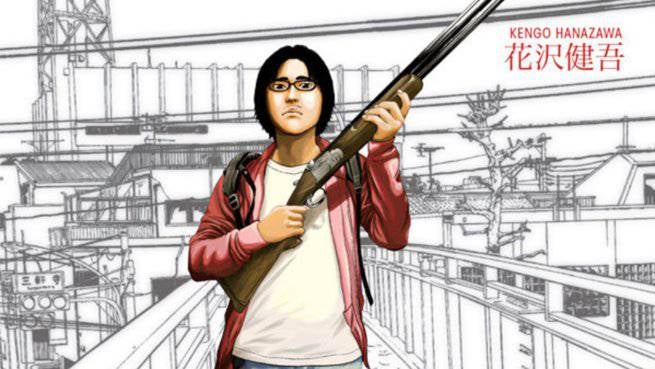I Am a Hero is based on the manga of the same name about a manga artist’s assistant and all around schlub, Hideo. I only really caught the first couple installments of the manga (there’s more than a dozen collected volumes, and at least three spin-offs), but it seemed that there were diminishing returns on the series. The opening, which takes place in the slowly gathering beginning of the outbreak, has a real intimate view of the zombie apocalypse. Hideo is just some jerk with no special knowledge, and his disaffection and depression keep him from really noticing the unsettling events occurring all around him. He delivers some nice sermonettes about how manga is the pinnacle of Japanese society and its greatest cultural export, which, in addition to being clumsily meta, might even be true.
These early sections were pretty enjoyable, but as the manga ranged out of whatever town Hideo was in (maybe Hiroshima?), I got more and more irritated with Hideo and his bullshit girl problems. I mean, it’s fine to have girl problems in the zombie apocalypse, it’s just the gender stuff in I Am a Hero that started really making me twitchy. Not that any of that is surprising in a certain kind of manga! Or comics in general! Or, come to think of it, zombie narratives in the first place! I have a huge hobby horse I like to get up and ride about the role of male violence in creating and maintaining domesticity in zombie fictions, but that is not the topic for today.
The film adaptation of I Am a Hero has the same episodic nature, but definitely smooths over some of the more pulp-sensible parts of the manga. The teen half-zombie girl Hideo befriends doesn’t end up part of a wtf zombie hive mind, more’s the better. The community he and the girl find is pretty messed up, but not openly practicing sexual slavery, like it is in the manga — thank god, because I fucking hate that trope. All in all, the movie improves on some aspects of manga, and there’s some fun scenes in there (like an absolutely harrowing one with Hideo’s zombified girlfriend, my God.)
The real reason to check it out (if you’re an American) is how weirdly it deals with its solitary firearm, Hideo’s shotgun. Japan and the United States have polar opposite attitudes about firearms of any kind: heavy regulation in Japan, plus no marked martial tradition involving firearms; virtual ubiquity in America, plus firearms are irrevocably bound to the national identity. Hideo gets real twitchy when his girlfriend throws him and his shotgun out of the house, but she doesn’t throw out the licence. He has these flights of fancy about using the weapon (and other things, often to very comedic ends) but the shotgun is largely talismanic, a term Hideo uses himself. He resists ever firing it for the entire film, even when beset by zombies or people.
It is literally a Chekhovian gun, so it is finally used, at utmost need, in a completely silly end sequence. He’s got like a hundred shells, and kills roughly one million zombies. Moreover, that shotgun was handled by someone who had no idea how one works, and no one around him could direct him correctly. And look, I know that the zombie fictions do not thrive on true realism, even in the more drama-y outings: Rick Grimes simply cannot make that many head shots, etc etc. I’m not suggesting this makes the sequence bad, or not worth watching. It’s actually one of the funnest in the movie.
But something about this sequence is fetishistic, but not fetishistic the way an American do it. In transporting zombie pulp (which originates in the States) to another culture, certain common motifs of the genre inevitably hitch a ride. Gun violence is bog standard in American zombie fiction, but not often found, in either art or life, in Japan. I Am a Hero addresses this trope in a typically Japanese manner. I think it’s really cool to see that sort of localization, to borrow a phrase from translation, a window into another culture.
